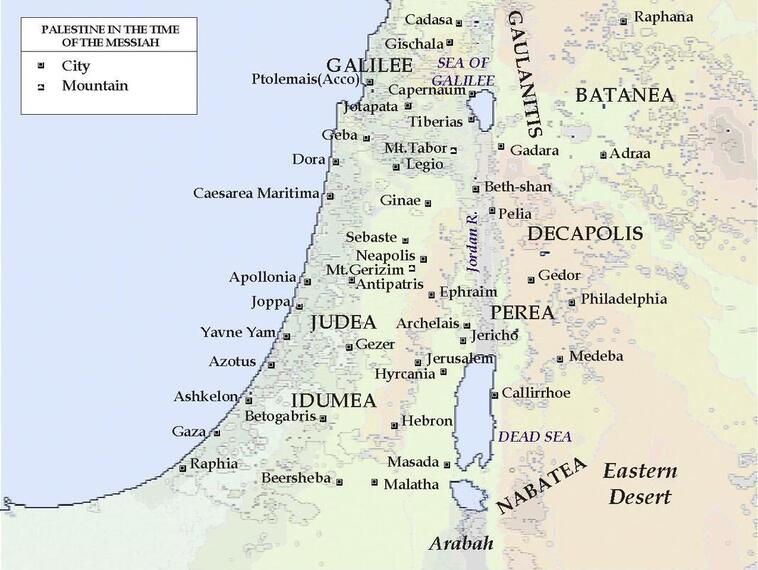Mark 2:1-17
Lesson 66
Lesson 66
Read both the "King James Bible" and the "New Living Translation."
In this lesson:
Opposition.
Jesus has the power to forgive sins.
Eating with sinners.
Opposition.
Jesus has the power to forgive sins.
Eating with sinners.
Study Tip:
Remember to review the margin notes in blue and to click on the links.
Remember to review the margin notes in blue and to click on the links.
Who were -
The Pharisees -
One of four Jewish religious sects, along with the Sadducees, Zealots, and Essenes. Pharisee is a Hebrew word meaning "the separated ones." They were a legalistic party of religious leaders who avoided anything not Jewish to study and live by the Torah (the Mosaic Law). They strictly, but often hypocritically, kept the Law of Moses and the "tradition of the elders (Matthew 15:2). They were a dominant force in Jewish society, and all religious ceremonies, prayers, and sacrifices were performed according to their decrees. The Pharisees believed in God, the authority of the Scriptures, the resurrection of the dead (Daniel 12:2), angels, and spirits (Acts 23:8), but they placed their own religious rules above God's. They continually added more and more of their own burdensome religious dictates on their followers to the point where true faith in God was lost. They righty anticipated the Messiah's arrival but expected him to be a great military/political leader. The Pharisees were so caught up in following the minute details of Jewish law that when Christ
arrived they didn't recognize Him as the Savior, even though they knew Jesus performed "many miracles" (John 11:47) and even witnessed some firsthand (Matthew 12:9-14; 21:14-15; Mark 3:1-6; Luke 6:6-11; Luke 14:2-4). They were good at spinning the truth and finding fault in others. They considered themselves more devout than other Jews and fasted twice a week (Luke 18:10-12), but few Pharisees were truly religious, and Jesus called them hypocrites on many occasions (Matthew 15:7-8; 22:18; 23:23-35; Luke 12:1). Their jealousy, pride, and anger towards Jesus turned to hatred, and their hatred led them to call for the crucifixion of the very Messiah they had been waiting for. To rid themselves of Jesus, the anti-Roman Pharisees even "took counsel with their bitter foes and pro-Roman Herodians" (Mark 3:6). In Jesus' time, there were approximately six thousand Pharisees' in Palestine.
The Pharisees -
One of four Jewish religious sects, along with the Sadducees, Zealots, and Essenes. Pharisee is a Hebrew word meaning "the separated ones." They were a legalistic party of religious leaders who avoided anything not Jewish to study and live by the Torah (the Mosaic Law). They strictly, but often hypocritically, kept the Law of Moses and the "tradition of the elders (Matthew 15:2). They were a dominant force in Jewish society, and all religious ceremonies, prayers, and sacrifices were performed according to their decrees. The Pharisees believed in God, the authority of the Scriptures, the resurrection of the dead (Daniel 12:2), angels, and spirits (Acts 23:8), but they placed their own religious rules above God's. They continually added more and more of their own burdensome religious dictates on their followers to the point where true faith in God was lost. They righty anticipated the Messiah's arrival but expected him to be a great military/political leader. The Pharisees were so caught up in following the minute details of Jewish law that when Christ
arrived they didn't recognize Him as the Savior, even though they knew Jesus performed "many miracles" (John 11:47) and even witnessed some firsthand (Matthew 12:9-14; 21:14-15; Mark 3:1-6; Luke 6:6-11; Luke 14:2-4). They were good at spinning the truth and finding fault in others. They considered themselves more devout than other Jews and fasted twice a week (Luke 18:10-12), but few Pharisees were truly religious, and Jesus called them hypocrites on many occasions (Matthew 15:7-8; 22:18; 23:23-35; Luke 12:1). Their jealousy, pride, and anger towards Jesus turned to hatred, and their hatred led them to call for the crucifixion of the very Messiah they had been waiting for. To rid themselves of Jesus, the anti-Roman Pharisees even "took counsel with their bitter foes and pro-Roman Herodians" (Mark 3:6). In Jesus' time, there were approximately six thousand Pharisees' in Palestine.
Israel during the time of Jesus.
Capernaum is north-west of the Sea of Galilee.
Capernaum is north-west of the Sea of Galilee.




